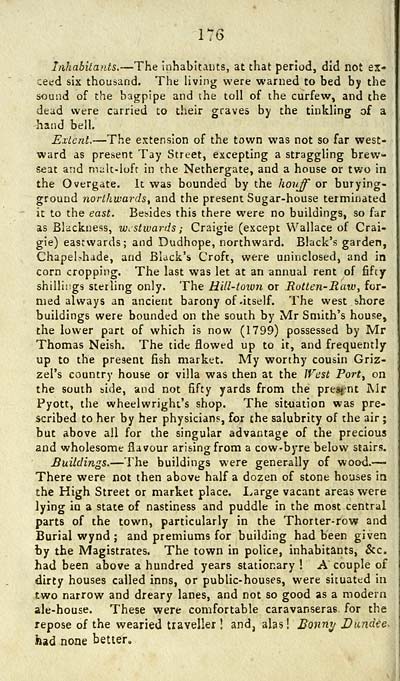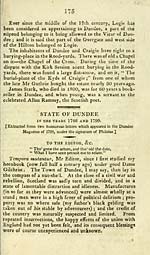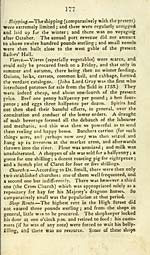Towns > Dundee > 1822 - Dundee delineated; or, A history and description of that town, its institutions, manufactures and commerce
(186)
Download files
Complete book:
Individual page:
Thumbnail gallery: Grid view | List view

l to 6
Inhabitants. — The inhabitants, at that period, did not ex-
ceed six thousand. The living were warned to bed by the
sound of the bagpipe and the toll of the curfew, and the
dead were carried to their graves by the tinkling of a
hand bell.
Extent. — The extension of the town was not so far west-
ward as present Tay Street, excepting a straggling brew-
seat and malt-loft in the Nethergate, and a house or two in
the Overgate. It was bounded by the houff or burying-
grouud northwards, and the present Sugar-house terminated
it to the east. Besides this there were no buildings, so far
as Blackness, westwards ; Craigie (except Wallace of Crai-
gie) eastwards; and Dudhope, northward. Black's garden,
Chapehhade, and Black's Croft, were uninclosed, and in
corn cropping. The last was let at an annual rent of fifty-
shillings sterling only. The Hill-town or Rotten-Raw, for-
med always an ancient barony of -itself. The west shore
buildings were bounded on the south by Mr Smith's house,
the lower part of which is now (1799) possessed by Mr
Thomas Neish. The tide flowed up to it, and frequently
up to the present fish market. My worthy cousin Griz-
zePs country house or villa was then at the West Port, on
the south side, and not fifty yards from the present Mr
Pyott, the wheelwright's shop. The sit-uation was pre-
scribed to her by her physicians, for the salubrity of the air ;
but above all for the singular advantage of the precious
and wholesome flavour arising from a cow-byre below stairs.
Buildings. — The buildings were generally of wood.—-
There were not then above half a dozen of stone houses in
the High Street or market place. Large vacant areas were
lying in a state of nastiness and puddle in the most central
parts of the town, particularly in the Thorter-row and
Burial wynd ; and premiums for building had been given
by the Magistrates. The town in police, inhabitants, &c.
had been above a hundred years stationary ! A couple of
dirty houses called inns, or public-houses, were situated in
two narrow and dreary lanes, and not so good as a modern
ale-house. These were comfortable caravanseras for the
repose of the wearied traveller ! and, alas! Bonny Dundee.
had none better.
Inhabitants. — The inhabitants, at that period, did not ex-
ceed six thousand. The living were warned to bed by the
sound of the bagpipe and the toll of the curfew, and the
dead were carried to their graves by the tinkling of a
hand bell.
Extent. — The extension of the town was not so far west-
ward as present Tay Street, excepting a straggling brew-
seat and malt-loft in the Nethergate, and a house or two in
the Overgate. It was bounded by the houff or burying-
grouud northwards, and the present Sugar-house terminated
it to the east. Besides this there were no buildings, so far
as Blackness, westwards ; Craigie (except Wallace of Crai-
gie) eastwards; and Dudhope, northward. Black's garden,
Chapehhade, and Black's Croft, were uninclosed, and in
corn cropping. The last was let at an annual rent of fifty-
shillings sterling only. The Hill-town or Rotten-Raw, for-
med always an ancient barony of -itself. The west shore
buildings were bounded on the south by Mr Smith's house,
the lower part of which is now (1799) possessed by Mr
Thomas Neish. The tide flowed up to it, and frequently
up to the present fish market. My worthy cousin Griz-
zePs country house or villa was then at the West Port, on
the south side, and not fifty yards from the present Mr
Pyott, the wheelwright's shop. The sit-uation was pre-
scribed to her by her physicians, for the salubrity of the air ;
but above all for the singular advantage of the precious
and wholesome flavour arising from a cow-byre below stairs.
Buildings. — The buildings were generally of wood.—-
There were not then above half a dozen of stone houses in
the High Street or market place. Large vacant areas were
lying in a state of nastiness and puddle in the most central
parts of the town, particularly in the Thorter-row and
Burial wynd ; and premiums for building had been given
by the Magistrates. The town in police, inhabitants, &c.
had been above a hundred years stationary ! A couple of
dirty houses called inns, or public-houses, were situated in
two narrow and dreary lanes, and not so good as a modern
ale-house. These were comfortable caravanseras for the
repose of the wearied traveller ! and, alas! Bonny Dundee.
had none better.
Set display mode to: Large image | Transcription
Images and transcriptions on this page, including medium image downloads, may be used under the Creative Commons Attribution 4.0 International Licence unless otherwise stated. ![]()
| Scottish Post Office Directories > Towns > Dundee > Dundee delineated; or, A history and description of that town, its institutions, manufactures and commerce > (186) |
|---|
| Permanent URL | https://digital.nls.uk/85826263 |
|---|
| Description | Directories of individual Scottish towns and their suburbs. |
|---|
| Description | Around 700 Scottish directories published annually by the Post Office or private publishers between 1773 and 1911. Most of Scotland covered, with a focus on Edinburgh, Glasgow, Dundee and Aberdeen. Most volumes include a general directory (A-Z by surname), street directory (A-Z by street) and trade directory (A-Z by trade). |
|---|


